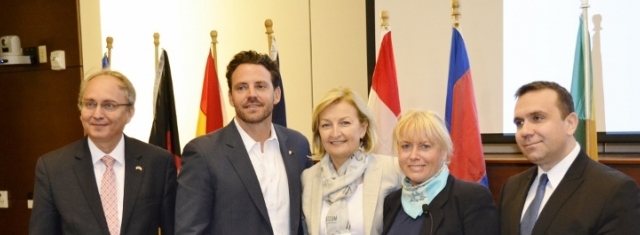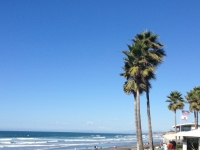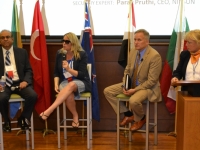Business
WORLD DIPLOMATIC FORUM2014 ENDS ON A HIGH NOTE IN CALIFORNIA
BIG LEAPS FOR BUSINESS & DIPLOMACY

World Diplomatic Forum2014 attendees included several international political leaders representing countries including Bulgaria, Macedonia, New Zealand, Guatemala, Turkey and Bosnia Herzegovina. Also in attendance were business leaders and industry experts including CEO Nico Sell with Wickr, Parag Pruthi CEO NIKSUN, Nathan Fletcher with Qualcomm, Eduardo Orenes with the Spanish Navy, Karl Rauscher, IEEE and CEO Igor Pasternak with Aeroscraft Corporation. Each of these individuals was given the opportunity to present their country´s triumphs, offer expert advice on possible shortcomings and collaborate on possible solutions to key global issues such as cyber security, education and defense. UC San Diego Chancellor Pradeep K. Khosla, just one of many high profile attendees, at the World Diplomatic Forum 2014, advised universities to build strong, global educational infrastructures or risk the future of effective learning . He pointed out that education is a global concern and, in some areas of the world, it faces an uncertain future. Future educational strategies and cybersecurity tactics remained common threads tying together the international community and educational leaders throughout this two-day event. Chancellor Khosla, as the educational tracks chair, led a discussion about the future of education and the future implications to present-day educational infrastructures.
Throughout his examination of the current state of education, Khosla mentioned that educational institutions should be run as enterprises through strategically formulated and retainable visions that are sustainable, international and multifaceted. He offered three key components of an effective educational institution in his talk, including: high-quality faculty, problem-solving acquisition and a non-cookie cutter learning experience.
During a subsequent educational roundtable discussion, Khosla stressed the importance of producing graduates who are well educated and remain lifelong students who can seamlessly interact in a multinational environment. Khosla said he views universities as being drivers of the economy and used Google as an example. Google began as a university research project between two Ph.D. students and is today one of the most successful companies in the world.
“All it takes is one great innovator to create thousands of jobs for people worldwide,“ said Khosla. “I believe freedom of thought and a hunger for knowledge remain important aspects to fostering innovation in education,“ said Consul General of New Zealand Leo Griece during the roundtable.
The World Diplomatic Forum also explored a topic of intense importance to governments, universities and the public: cybersecurity. A panel consisting of industry experts including Karl Frederick Rauscher, ambassador and chief architect for cybersecurity policy, Institute for Electrical and Electronics Engineers (IEEE); privacy expert Nico Sell, Wickr CEO; and security expert Dr. Parag Pruthi, Niksun CEO, discussed smart strategies to secure critical communication.
“No technology is perfect“ said Sell, who, as a hacker herself, recommended befriending the hacker as opposed to penalizing them. Her suggestions to the international community revolved around keeping your identity safe by utilizing separate phones for different functions, speaking in code and putting out incorrect information into the digital sphere.
Spanish Navy Cryptology Chief Eduardo Orenes later agreed in his own discussion that the private sector should be placing a greater emphasis on cybersecurity since we´re in a time where cyber Nathan Fletcher , Senior VP global operations Qualcomm Technologies spoke to the latest innovations in the connectivity of transformative technologies especially as they related to health, education and smart cities. Rates of change have increased markedly. What took thousands of years to change transportation, for example, now only takes one or two human generations. Connectivity, then, is both exponential and generational. The possibilities are almost limitless but there still needs to be attention to balance and ethics in the process. focused on the upside of technological progress. He introduced the power of mobile technologies by saying, “We have the Apollo in our pockets,“ referring to the technology used in the 1960´s in the Apollo Spacecraft. He emphasized that mobile technologies have the ability to connect the world in unimaginable ways and envisions a society where one day even the refrigerator will have the ability to warn you that you´re dehydrated.“No matter what aspect of life we look at, mobile technology has transformative change,“ said Fletcher.
Igor Pasternak, CEO of Aeroscraft presented on the design and manufacturing of lighter-than-air (LTA) aircrafts which he spearheaded since its inception more than 25 years ago. Today, the Aeroscraft Corporation (Aeros) is the world´s most innovative FAA-certified LTA manufacturing company with products used globally for military and commercial applications, including the non-rigid Aeros 40D Sky Dragonairship, advanced tethered aerostatic systems and portable communications and surveillance towers.
The conference serves as a hub for multinational and multicultural business leaders to address issues that affect many societies globally on a daily basis. Whether it was Igor Pasternak sharing his revolutionary airship technology with Aersocraft or Chancellor Khosla sharing his philosophy on education with Macedonia´s ambassador, international connections were created at the World Diplomatic Forum that could help solve some of the world´s most pressing problems.
Great kick off - the World Diplomatic Forum 2015 is up and running!







